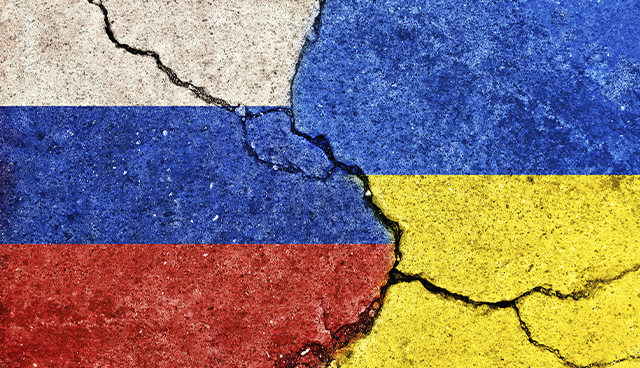Russian invasion of Ukraine and the implications for Ireland

The Russian invasion of Ukraine continues to have pervasive implications. With a housing system being further tested by the more than 40,000 refugees who have arrived, as well as record fuel and energy prices, the Government continues to support the comprehensive sanctions on Russia.
As of August 2022, Russia controls roughly 20 per cent of Ukraine’s territory, including Crimea – which it has occupied since 2014 – and the self-declared breakaway republic of Luhansk, as well as much of the Donetsk Oblast, which incorporates the city of Mariupol. Ukraine has thus far successfully retained the port city of Odesa and successfully repelled attempts to capture the capital city, Kyiv.
Housing refugees
For Ireland’s part, the impact is multifaceted. Firstly, there is the housing and refuge to be provided to those fleeing from the war in Ukraine. Ireland has committed to facilitating as many refugees as necessary from Ukraine, with the Department of Justice projecting that up to 80,000 could arrive in Ireland for the duration of the conflict. As of 8 August, 44,365 refugees have arrived in Ireland, according to the Department of Justice.
The Department of Housing, Local Government and Heritage announced in March a €400 monthly payment for households who have housed refugees from Ukraine, a payment which started being paid out to qualified citizens from 9 August.
The Government has been struggling to accommodate the influx of refugees, and has resorted to calling on hotels, student accommodation, and GAA clubs to facilitate the provision of temporary housing for refugees. On 7 August, the Government announced that around 3,000 Ukrainian refugees currently housed in student accommodation will have to leave by the end of August, ahead of the upcoming academic year.
A new foreign policy
In February 2022, Taoiseach Micheál Martin TD declared that Ireland was “not politically neutral”, but was “militarily neutral”, thus affirming Ireland’s adherence with the foreign policy agenda being pursued by the European Union. That policy is clear: oppose Russia’s invasion and facilitate Ukraine’s defence of its borders by any means necessary without provoking direct conflict between Russia and the west.
Ireland’s foreign policy has been thrown into a state of flux arising from the EU’s robust response to the Russian invasion. The State has traditionally followed a policy of military neutrality since then-Taoiseach Éamon de Valera’s decision to remain neutral in the Second World War. Ireland’s neutrality has been called into question in the past due to the facilitation of Shannon Airport as a stopover point for the United States Air Force during the wars in Afghanistan and Iraq. The Taoiseach, in February, asserted that the Government would support the “strongest” and most “comprehensive sanctions” against Russia, and stated that Ireland is “militarily neutral” but not “politically neutral”.
The Taoiseach additionally created speculation that Ireland may join NATO after meeting with NATO and EU leaders in June. He furthermore stated that, in the event of such a decision, that the Government would not “need a referendum to join NATO”. This is due to the fact that military neutrality has been a convention adopted by successive governments but is not enshrined in the Constitution.
The Taoiseach has confirmed that the Government would hold a referendum in the event of a European Union defence pact, since there are provisions in the Constitution which stipulates the requirement for such a referendum.
Sanctions on Russia
The economic ramifications from the conflict globally cannot be overstated, with Ukraine exporting 40 per cent per cent of the world’s supply of grain, according to the UN Food and Agriculture Organisation. Furthermore, the disruption of the flow of Russia’s oil and gas, and the inflation crisis, which arose amid the supply chain crisis arising from the Covid-19 pandemic, has been exacerbated and has resulted in record fuel and energy prices.
Ireland is following the European Union’s implementation of comprehensive sanctions against Russia and Belarus as a backlash to the invasion, which are intended to curtail the importation of 90 per cent on oil imports from Russia. The EU announced that all crude oil imports from Russia will be phased out by February 2023, as well as a ban on insuring ships which carry Russian oil taking effect from December 2022. Furthermore, with the Russian economy experiencing 15 per cent inflation and a deep recession, the EU has banned investment or participation in projects co-financed by the Russian Direct Investment Fund, as well as transactions related to the management of assets and reserves of the Russian Central Bank, and the Belarusian Central Bank.
Some have criticised the sanctions as having an adverse effect to what was intended, as the Russian Rouble has since recovered from the initial economic shock from the sanctions, and its valuation is now stronger than it was throughout the second half of 2021. Having had its 10 largest banks removed from the SWIFT banking networks, Russian banks have subsequently been able to use the Chinese banking system, with China providing a large market for many Russian exports.
The European energy market has to find new means of making Europe energy independent, which will include a temporary increase of German coal-powered energy, as well as emphasising the long-term importance of ensuring a reliance on renewable energy.





